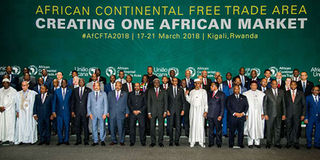African solutions to African problems

African Heads of State and Governments pose for a group photo during African Union Summit for the agreement to establish the African Continental Free Trade Area, in Kigali, Rwanda, on March 21, 2018. The EAC’s enthusiasm and appetite for regional and continental trade is telling. PHOTO | AFP
What you need to know:
- The birth of AfCFTA is in tandem with the hopes and aspirations of the founding fathers of the independent African states.
- The potential of Africa to compete effectively with the rest of the world and excel by trading with itself is limitless.
The dwindling demand for African goods in the United States, Europe and elsewhere has provided the greatest impetus for increased intra-Africa trade, of which the African Continental Free Trade Area (AfCFTA) is a supreme instrument.
The continent stands to lose immensely if it continues to rely on markets beyond its frontiers for sustainability.
But it seems to have awoken to this reality and is seeking African solutions to its trade problems. That is why, on Tuesday and Wednesday last week, Addis Ababa hosted the initial dialogue on the implementation of AfCFTA.
Themed “Policy Dialogue of African Business Associations on Implementing the African Continental Free Trade Area”, the event brought together more than 70 participants who are the stakeholders from state and non-state institutions and the business community from across Africa who will be the key drivers of the continent-wide initiative.
The main objective of the event was to bring African business organisations and leading business people together to gain a deeper understanding of AfCFTA objectives, landscape, sectoral policies and institutional arrangements with a view to supporting the implementation of the ambitious trade bloc and taking advantage of the opportunities presented by a continental single market.
SUPPORT
The need to look for African solutions for African problems has never been more evident as it has become fairly clear that the developed world may not be genuinely interested in its development.
African states have become keenly aware of the so-called development partners in the global North, whose desire to see the continent flourish is suspect.
The coming to fruition of the AfCFTA on May 30 this year was the culmination of decades of concerted efforts to integrate trade within and between African states in order to enhance the continent’s global competitiveness.
AfCFTA came into formal existence 30 days after the 22nd state ratified its creation.
To date, 54 countries have signed the agreement to create AfCFTA while 27 have officially ratified the creation of the institution.
Eritrea is the only African country that has not yet signed the agreement, underscoring the overwhelming continental support that AfCFTA has attained so far.
TRADE INCOME
This is a testament to the overall goodwill and the realisation among African states that the time for increased intra-Africa trade has arrived. And it has, for sure, been long in coming.
According to the 2018 "East African Community Trade and Investment Report" prepared by the East African Community Secretariat in Arusha, the value of trade between EAC partner states increased to $5.98 billion (Sh598 billion) in 2018 from $5.46 billion (Sh546 billion) in 2017, a 9.4 per cent growth.
It is significant that the initial signing of the AfCFTA agreement at the AU Special Assembly by 44 member states was in the Rwandan capital Kigali on March 21 last year.
East African states, including Kenya, were among the first to deposit documents ratifying the agreement soon afterwards. The EAC’s enthusiasm and appetite for regional and continental trade is telling.
GET IMPLEMENTATION RIGHT
The birth of AfCFTA is in tandem with the hopes and aspirations of the founding fathers of the independent African states, who envisaged an Africa increasing trading with itself to be in tune with the rest of the world rather than remain perpetually dependent on uneven global trade.
The potential of Africa to compete effectively with the rest of the world and excel by trading with itself is limitless.
One would say that is Africa’s best last chance to unchain itself from dependence on patronising and reluctant trade partners.
It is mind-boggling that Africa enjoys the world’s largest free trade area with a potential market of 1.5 billion people and a combined gross domestic product of $2.5 billion (Sh250 billion). AfCFTA could not have come at a more appropriate time.
Granted, discussions on the implementation of the agreement are good but not good enough.
It is the actual implementation that will make or break Africa’s trade prospects in the global scheme of things.
STABILITY
It, therefore, behoves institutions and individuals charged with implementing AfCFTA to go above and beyond “talking” at the AU commission headquarters.
They have no choice but to walk the talk to ensure that Africa realises its full potential through a conducive intra-trade atmosphere.
In addition, a stable environment of intra-trade in Africa might just save the continent from the gaping jaws of the second scramble for it that is so evident in this age and stage.
Prof Walibora is the director, Global and Languages Studies Centre at Riara University. [email protected]



